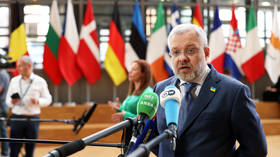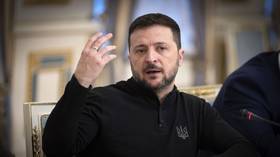Solzhenitsyn laid to rest
The funeral has taken place in Moscow of dissident writer Aleksandr Solzhenitsyn. He was buried on Wednesday at Donskoy monastery after an elaborate service. Russian President Dmitry Medvedev was among the mourners. Solz
It was the funeral Solzhenitsyn wanted – to be laid to rest at Moscow’s Donskoy Monastery. He applied for permission five years ago. The Head of the Russian Orthodox Church, Patriarch Alexy II, gave his blessing.
Solzhenitsyn’s grave had been prepared behind the altar of the Church of St John of the Ladder.
To watch the funeral ceremony at Donskoy Monastery please follow the link.
Moscow Patriarchy Father Superior Nikolai Balashov said Solzhenitsyn had “prepared for death as a Christian does, long before it came.”
President Medvedev interrupted a short working holiday to the cities along the Volga River to be there. Carrying a bunch of burgundy roses, he spoke to Aleksandr Isayevich’s widow Natalya and their sons.
The Nobel Prize winning writer continued working until his death, despite being very ill in recent months. His last project was a 30-volume edition of his complete works, which he and his wife were compiling.
Solzhenitsyn had three wishes regarding his death: to die at home rather than in hospital, to die in summer rather than winter, and to die surrounded by his wife and family. Each of his wishes was granted.
A man who shaped history with his writing
Nobel laureate, Aleksandr Solzhenitsyn, was one of Russia’s most respected writers and cultural figures of the 20th century. He experienced both fame and repression. After years in exile in America, he eventually made a triumphant return to his beloved Russia.
A former army officer, he fought against Nazi Germany in WW2. After criticizing Joseph Stalin in a private letter, he was imprisoned in a labour camp. He earned fame in the 1960s when he began to publish.
His novel “One day in the life of Ivan Denisovich”, which described the atrocities of Stalin’s labour camps, was published when political censorship in the Soviet Union was liberalized.
But just a few years later times changed again, and his work was labeled anti-soviet propaganda.
Solzhenitsyn outraged Soviet authorities when his books were published in the West.
In 1970 he was awarded the Nobel Prize for literature. His books were taken off the shelves of public libraries. Three years later his monumental ‘Gulag Archipelago’, which revealed the Stalin-era repressions, was published in the West.
In 1974 he was stripped of his Soviet citizenship and deported.
Living in the U.S., he was highly critical of the West, claiming it had lost its spirituality and moral values.
Solzhenitsyn won back his Soviet citizenship in the Gorbachev era.
In 1994 he returned to Russia and received a hero's welcome by thousands. His return was a world sensation, followed by a two-month tour across the country, from Vladivostok to Moscow.
Until the end of his life, Solzhenitsyn said only moral values and faith could help Russia survive the hard times. He hoped that he'd managed to fulfill his mission – to make people aware of what Stalinism was all about.
“I now hope that the historical materials and evidence of those cruel and troubled years collected by me and presented to the public will be remembered,” Solzhenitsyn once said – a remedy, he hoped, for such things not to happen ever again.













